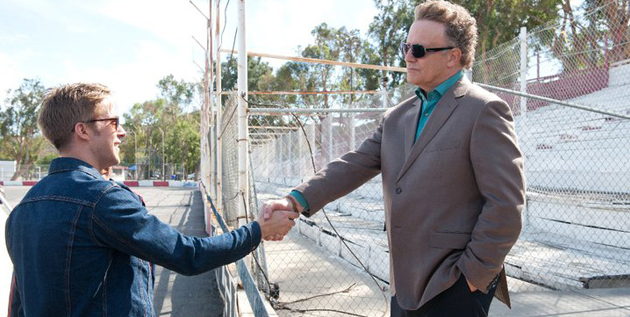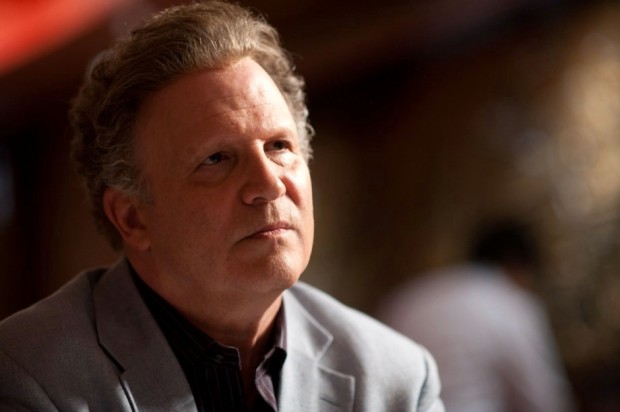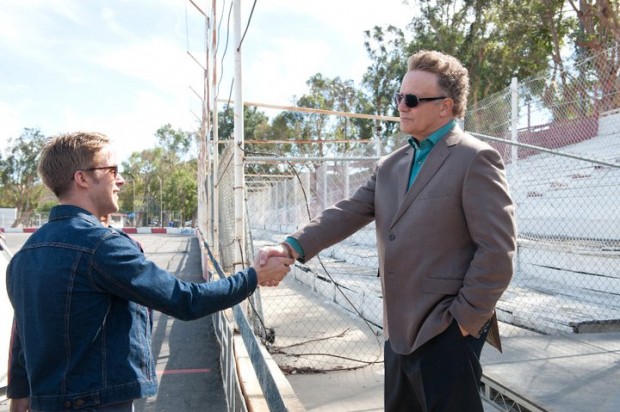Albert Brooks, the noted stand-up, writer, director, actor, and novelist, recently sat down to talk about the latest film he’s acting in, Drive, as well as…well…everything he else he puts a hand to. During this round table interview, he discusses the process of making his own films against the creation of a novel, which Drive cast member does the best Johnny Carson impression, how he handled the expensive (not to mention dangerous) knives his character Bernie cherished so, and how playing such a terrifying character could be a useful parenting tool (excluding the knives, natch).
The following is a transcript from our roundtable interview. My questions, along with those who sat in on the table, will be in bold. Mr. Brooks’ answers follow.
The Film Stage: You’re a very prolific filmmaker in your own right. How was the experience of just acting?
Albert Brooks: I love doing that because I don’t have the responsibility of a picture going over budget and I don’t have to deal with… There are three phases of making your own movie: you write it, and then you make it, and then you release it. If the releasing doesn’t go well, it’s all a nightmare. And if the studios aren’t happy, then everyone hates you, and you don’t want to go to work. So when you act in a movie, I mean, this movie turned out great so Nicolas [Winding Refn, director] is having a much better time than I am. But if it didn’t, I’d rather just act. You don’t have to take on that sort of financial problem.
And the burden of all that, too.
Yeah! When you’re directing that’s all they talk to you about every day, how “we’ve got to figure something out because we’ve gone over [budget] and it’s going to rain on Wednesday.” It’s like being a contractor.
But this, you come down, punch in, do your work?
That’s it! It rains, I’m in the trailer, I’m reading, come get me, send me home, I don’t care what you do! (laughs)
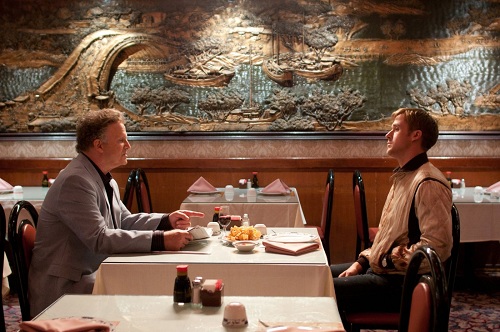 What was it like preparing for this particular role?
What was it like preparing for this particular role?
What I like to do, no matter what I play, or even when I write [a movie], I think background is hugely important, just for the actor to know. Stuff that never comes out. What I did was, because Bernie wasn’t really filled out, so I sort of made up a very complicated back story for Bernie and what happened to his marriage, where are his kids, why did he go to Los Angeles and all that stuff. I ran it by Nicolas and Nicolas was all fine with it so you prepare mostly like that.
[For] the physical things, they had a guy that was on set who was a knife expert. He not only helped us pick the knives…you know, you just don’t pick up those knives. You’ll cut your hand off. I mean I had it in my pocket and he said, “y’know, you’re not going to want it in your pocket cause when you reach in to get it, you’ll cut a testicle.” So you try to handle [this role] like you’ve handled [them] before. The part is written, I understood what the motivation was, so mostly it’s filling in the spaces that aren’t there.
What was that backstory that you imagined for him?
Well, Bernie grew up with Nino [Ron Perlman‘s character], the only two Jews in an Italian neighborhood. And, I would say, never rose to any real important level [in the crime world], made enough money where he came out to Hollywood and, as he said, he made movies but not for the glory of the movies but because there was some money in it. You could turn a profit. You make these cheap exploitation films and you could make a hundred grand and you’re done. And that didn’t go well. We always thought that Bernie was divorced, that he had two kids that never came out anymore, grown kids that he just basically didn’t talk to. I mean, I could go on and on. I thought he had two hookers that he probably saw regularly.
One of the things that I thought was interesting was exporting cars illegally, cause that’s a very big business. Range Rovers in China sell for a quarter of a million dollars and you’re not legally allowed to go buy a Mercedes in Manhattan and send it to Singapore, but you can do that with some manipulation. So that, and loaning money, a very staid, quiet life. That’s why the violence in this movie, that is so irritating that it has to come to him. He’s not getting up looking for these issues. He’s upset about it.
But he has the capacity for it.
Always the capacity. There’s probably a murder in his past. I figured when he was in his twenties. He knows he can do it, but that’s not what–he’s not killing people. When push comes to shove, and it’s me or you, I’m going to try to make it, you know? I’m sorry. There you can’t push him. He’s not gonna die for you.
Is there a fine line between your character in, let’s say, Lost In America when he gets so angry at his wife he says, “I’m going to kill you” and Bernie?
No. But I’d say there’s a finer line in a movie I made called Modern Romance because [that] obsessive-compulsive behavior now will get you put in jail. I mean, you get a restraining order for driving around a girl’s house five hundred times (laughs). You’re not allowed to do that anymore. You know, it was called “love” then, now it’s called “illegal.”
Anger is weird. Anger comes out of the most interesting places. It’s always funny to me, but everybody who does a horrendous act, [reporters[ always talk to the neighbors and you always hear the same thing, “he was the nicest guy.” No neighbor ever says, “I knew it! I could see, he tried to take his broom and shove it up his butt! I knew it!” You never see that! They’re very calm people, they’re friendly people, and they’ve got this potential. Bernie’s not a psychopath. He’s not going out in the middle of the night and picking up people and killing them, but he’s capable of self-preservation. That, I think, he’s capable of.
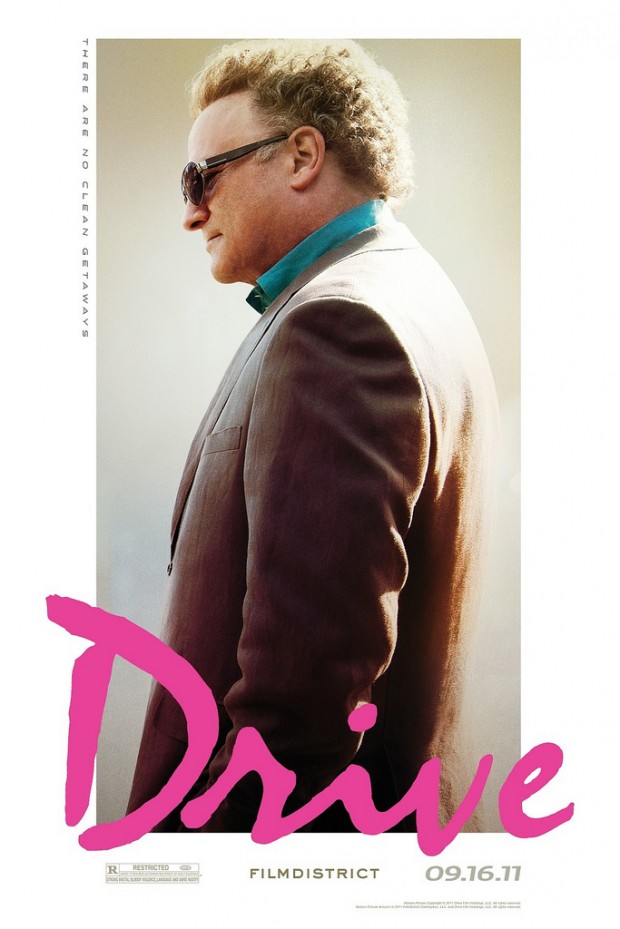 Do you know any background stories of the different kinds of knives he has?
Do you know any background stories of the different kinds of knives he has?
I would have to look as I had it written in my script. I know there’s actual names for [them] but I don’t have it in front of me. I think the razor that was used in the Shannon scene was just that. It just had a very expensive handle. I wrote all that stuff down but I didn’t memorize the name. But, you know, they were valuable, because a couple of them they said, “don’t even pick up.” (laughs) When I opened that case, the guy just said, “don’t touch those two.”
What was your working relationship like with the other actors on the set?
Ryan [Gosling] played a character that didn’t speak very much and that’s sort of the way it felt on the set. We were always very nice to each other but I actually said to him early on during a break, “are you never going to talk?” Because he just made that choice. And I didn’t know the choice he made in the rest of the picture, so there were a couple of times–and [Nicolas] has it on film–where I just, as Bernie Rose, berated him for it. You know, he has that toothpick, and I know in one take in the garage, I said to him, “why do you keep that fucking thing in your mouth? You look like a hick. Why don’t you be a boy, take it out, be polite.” You know, so he’s just looking at me, he doesn’t ahve anything to say to me. In the Chinese restaurant he sat down, I ask “you want something to eat?” and he just stares at me. And I said, “you know ‘no’ is a nice answer. No thank you. You can say ‘no thank you.’ ”
It wasn’t the kind of thing where as soon as it was “cut” we were joking around. I joked around more with Bryan Cranston because he’s a frustrated comedian. He likes to do Johnny Carson all day. [In Cranston-as-Carson voice] “My friend Ed!” He likes to imitate people. But sometimes you do it just to break the tension, y’know? In these scenes that were so violent, and Nicolas does so many takes, that when you do this over and over you start to work yourself up into a frenzy. So you just go sit down by yourself, take a deep breath….
One day I came home and my wife told me that I scared the shit out of my kids, cause I hadn’t let Bernie go. My son didn’t do his homework and instead of me I said [as Bernie] “Get in your room. Get up right now.” Wait, who’s talking? It was like the Exorcist (laughs). They’re thirteen and eleven-and-a-half. My wife, who hates violence, said, “we need to take the kids to the movie.” I said, “I don’t want to take the kids to the movie.” She said, “they need to know you mean business.” (laughs) What are you saying? I’m going to threaten their lives if they don’t get a B?
You were terrifying in that role.
Yeah, it worked.
As a parent, it’s nice to have that little trump card just in case. To keep them honest.
I could do like A Clockwork Orange and keep their eyes open, make them watch the same scene over and over.
Do you find any similarities in the way you prepare for this role as your other roles for the films that you wrote? And also, iconic roles like in Broadcast News?
No, Broadcast News we had the luxory of…. Holly Hunter and I–Bill [Hurt] wasn’t able to–but Holly and I came to Washington, D.C. two-and-a-half weeks before filming and got CBS News credentials and were taken around every day. Just to live and breathe and do that stuff. That’s the one thing that movies can do that’s so cool. If you’re going to play a surgeon…. Normally a surgeon, if you came to a hospital and said, “I’d like to know what a surgeon’s like,” [they wouldn’t be like] “oh, that’s a nice thing, come with me!” But if it’s a movie or if you’re a novelist and they think it’s important enough then you can get in and sort of juts be a fly on the wall of someone else’s life. Well I didn’t know anyone like Bernie so I wasn’t going to, you know, hang around and do money laundering (laughs). Get arrested as research. But I’d say it’s different. When you have the opportunity to dip into another profession (that’s legal) you do it, just so you can feel it.
What do you do in this case when you can’t go and….
Well you take what’s written, and you fill in your own story, and you talk to the writer and you talk to the director and you understand it. It’s like if you read a book, you can understand a character. [Bernie] was a well-drawn character. Where they chose to have Bernie live. You didn’t see it in the movie, but the location was very authentic. It was on Wilshire Boulevard, near downtown Los Angeles, in one of these old, grand apartment buildings that still have beautiful architecture. As soon as they showed me this I went, “oh, I get it, ok.” You start to fill that out and then you pick costumes and you fill out a guy. You can understand who somebody is. It’s not a specialized profession. He’s not an eye doctor where you have to know the vitreous humour to understand what I’m doing. But you do as much filling in as possible.
In the same way with the movies that you’ve made, do you give your actors the same sort of freedom, or do you in your scripts really flesh out the characters and give them your own backstory?
I give them the backstory. As much…. And I also welcome questions, and I’ll try to give them a clear enough picture of the character other than what’s written. And many of the actors will ask a million questions. I mean, I just did a scene in this Judd Apatow movie and I’m playing Paul Rudd’s father and before we started I had a thousand questions. So I’d keep emailing Judd and after a while he wouldn’t answer, you know? (laughs). [in mock anger] “Yeah, fine, so he worked in construction, if that’s what you want!” (laughs)
I’m not sure how long, or when, the shooting for Drive occurred.
This was last fall.
Were you still in the process of writing your novel [“2030”]?
No, I finished my novel, I had turned it in, and it was in the long process of publishing of a book, which goes to galleys…. So I turned in the book around late September, and I think this just started filming. So during the filming I would get proofs and read that and correct the proofs but I had finished the book.
And how does the process of that, the galley process and that, compare to the process of making a film?
Well let me tell you something, it’s not the galley process, it’s the writing. And the writing was the freest experience I ever had because I had become an idiot savant of how to write for low budgets. I just wouldn’t include a scene that was expensive. Even though I thought of it I would [snaps his fingers] just knock it out. So you and I would be in a room, we wouldn’t be on a train. When you’re writing a book and you could realize, “I could put us on a plane! I could put us in China! This guy could even want to go to the moon and see what a rocket looks like,” you know? It was like, “oh my god!” It was back to your imagination having no budget on it.
Do you have another film that you’re working on?
Right now, the publisher wants another book and is being very effusive, and yet I met someone in Toronto [for the film festival] who has a big funding company, and he said, “I’m a freak fan and any movie you want to do….” What I’d most like to do is to get another interesting part that’s not something I play. I don’t know if it’s out there. But once I start a movie, I’m off the market. Movies take me two-and-a-half years from start to finish, so you can’t stop in the middle and act for anyone else. You’ve got a crew, you’ve got a staff, “I’ll be back in four months.” They say Charlie Chaplin used to shut down and keep everybody employed. That doesn’t happen anymore.
Drive hits theaters Friday, September 16th.

